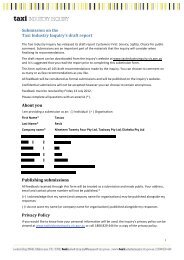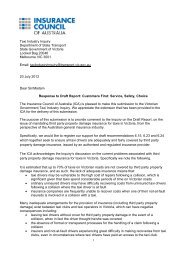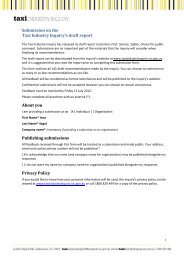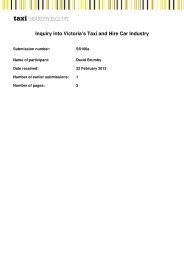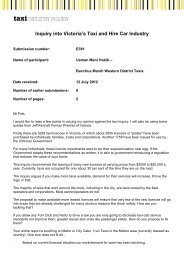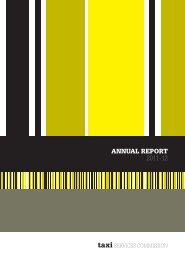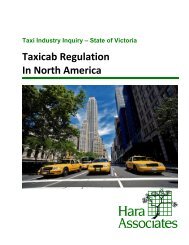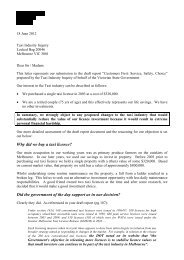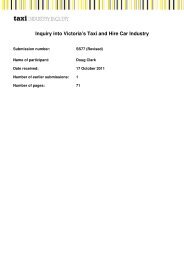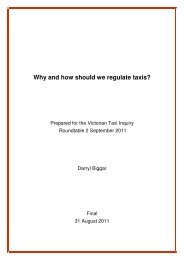Part D â Understanding and improving industry performance (PDF ...
Part D â Understanding and improving industry performance (PDF ...
Part D â Understanding and improving industry performance (PDF ...
Create successful ePaper yourself
Turn your PDF publications into a flip-book with our unique Google optimized e-Paper software.
McQuillen review<br />
Without undertaking further research or analysis, the<br />
author of the McQuillen review reached a different view<br />
in relation to zoning. He felt that there appeared to be a<br />
strong argument for the retention of the Frankston <strong>and</strong><br />
D<strong>and</strong>enong zones <strong>and</strong> added that there was anecdotal<br />
evidence of service shortages in outer suburban areas,<br />
particularly in the Shire of Yarra Ranges <strong>and</strong> the City<br />
of Werribee. There was no consideration of whether<br />
restrictions on licence numbers in general may have had<br />
this effect. McQuillen further commented:<br />
The continuing metropolitan sprawl into Pakenham,<br />
Berwick, Cranbourne, Lilydale, Hoppers Crossing,<br />
Craigieburn etc. does raise some concerns about the<br />
maintenance of good service. I am not confident, on<br />
the information <strong>and</strong> time available to make a<br />
judgement one way or the other. I recommend that any<br />
decision on the future of zoning be deferred until such<br />
time as a proper study can be made of the issue. 87<br />
The Victorian Government responded to the KPMG<br />
<strong>and</strong> McQuillen reports in 2002 by issuing a 17 point taxi<br />
<strong>and</strong> hire car reform program, which included the<br />
following points:<br />
13. The country zone structure establishing separate<br />
taxi markets will be reviewed in 2002/03 to<br />
ensure the structure meets customer needs.<br />
14. The requirement for taxis to operate from a<br />
taxi depot will be retained to ensure there are<br />
centralised booking <strong>and</strong> dispatch services.<br />
15. Future arrangements to apply in the outer<br />
metropolitan taxi zone will be reviewed in 2002<br />
<strong>and</strong> will be considered in light of taxi <strong>performance</strong><br />
st<strong>and</strong>ards <strong>and</strong> a measure of existing service levels<br />
in those areas. 88<br />
The inquiry notes that no subsequent study of the merits<br />
of retaining the outer suburban zone occurred.<br />
A study was undertaken in 2004 of country zones by<br />
a consultant to the VTD. This review (which does not<br />
appear to be publicly available) focused on areas where<br />
neighbouring zones were likely to have a significant<br />
amount of traffic between them. The review was<br />
nominally aimed at <strong>improving</strong> service for consumers,<br />
although the consultant appeared to rely entirely on<br />
representations from the VTA <strong>and</strong> from operators within<br />
the zones studied. 89<br />
Perhaps unsurprisingly, the consultant was able to find<br />
few problems with the current arrangements – noting<br />
minimal complaints by consumers to operators – <strong>and</strong><br />
primarily focused on problems that occur when taxi<br />
operators do work that is completely out of their zone.<br />
Little primacy was given to the costs of the current<br />
arrangements on operators (reduced operator viability<br />
impacts on consumers when the regulator takes this into<br />
account when deciding whether to issue new licences).<br />
Recommendations from the review were to make<br />
the zoning restrictions more restrictive by preventing<br />
operators from one zone doing pre-booked work entirely<br />
within another zone.<br />
10.4.3. UK Department of Transport <strong>and</strong><br />
other analyses of zoning<br />
Zoning is a common feature of the taxi industries in most<br />
jurisdictions <strong>and</strong> countries. The UK government has<br />
developed a best practice guide in relation to taxi <strong>industry</strong><br />
regulation for local authorities that supports the abolition<br />
of zones.<br />
Zoning tends to diminish the supply of taxis <strong>and</strong> the<br />
scope for customer choice – for example, if fifty taxis<br />
were licensed overall by a local authority, but with<br />
only twenty five of them entitled to ply for hire in each<br />
of two zones. It can be confusing <strong>and</strong> frustrating for<br />
people wishing to hire a taxi to find that a vehicle<br />
licensed by the relevant local authority is nonetheless<br />
unable to pick them up (unless pre-booked) because<br />
they are in the wrong part of the local authority area.<br />
Abolition of zones can also reduce costs for the local<br />
authority, for example through simpler administration<br />
<strong>and</strong> enforcement. It can also promote fuel efficiency,<br />
because taxis can pick up a passenger anywhere in<br />
the local authority area, rather than having to return<br />
empty to their licensed zone after dropping a<br />
passenger in another zone. 90<br />
An interesting study on zoning-type restrictions was<br />
undertaken by Flores-Guri, with specific application<br />
to the inefficiencies caused by the separate Boston-<br />
Cambridge zones in the United States. Flores-Guri found<br />
that eliminating zones between closely aligned areas can<br />
improve market <strong>performance</strong>, even if one is obliged to take<br />
account of the profits earned by operators in both zones:<br />
87 McQuillen, Rob PSM (2001), Op. Cit , p.28<br />
88 See chapter 7 for more detail about the 17 point program<br />
89 McQuillen, Michael (2004), Review of Zoning Arrangements for<br />
Country Taxi Cab Operations, January 2004, Appendix 1<br />
90 UK Department of Transport (March 2010), Taxi <strong>and</strong> Private Hire<br />
Vehicle Licensing: Best Practice Guidance, London, para. 90<br />
208



